
Clibanarius is a genus of hermit crabs in the family Diogenidae. Like other hermit crabs, their abdomen is soft-shelled and sheltered in a gastropod shell. Typically marine like all their relatives, the genus includes C. fonticola, the only known hermit crab species that spends all its life in freshwater. The feeding rates of Clibanarius species change with temperature which, given their broad distributions, may have considerable consequences for the stability reef systems as sea temperatures rise in the future.

The Diogenidae are a family of hermit crabs, sometimes known as "left-handed hermit crabs" because in contrast to most other hermit crabs, its left chela (claw) is enlarged instead of the right. It comprises 429 extant species, and a further 46 extinct species, making it the second-largest family of marine hermit crabs, after the Paguridae.

Echidnocerus is a genus of king crab. It includes Echidnocerus foraminatus and Echidnocerus cibarius, the Puget Sound king crab. The genus was long known as Lopholithodes until it was discovered in 2022 that Lopholithodes is a junior synonym of Echidnocerus.
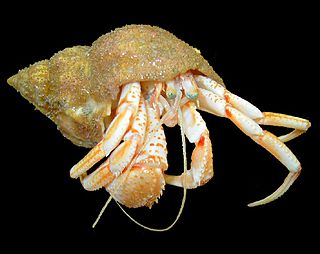
The Paguridae are a family of hermit crabs of the order Decapoda. The king crabs, Lithodidae, are now widely understood to be derived from deep within the Paguridae, with some authors placing their ancestors within the genus Pagurus.
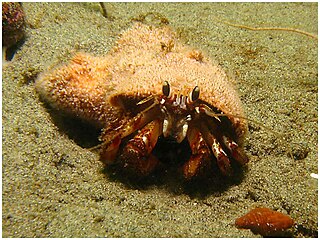
Pagurus is a genus of hermit crabs in the family Paguridae. Like other hermit crabs, their abdomen is not calcified and they use snail shells as protection. These marine decapod crustaceans are omnivorous, but mostly prey on small animals and scavenge carrion. Trigonocheirus and Pagurixus used to be considered subgenera of Pagurus, but the former is nowadays included in Orthopagurus, while the latter has been separated as a distinct genus.
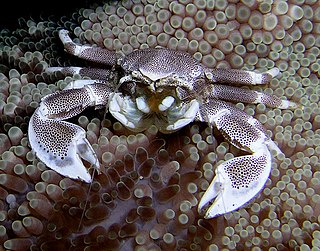
Neopetrolisthes maculatus is a species of porcelain crab from the Indo-Pacific region. It is a small, colourful crustacean with a porcelain-like shell. This porcelain crab is usually found within the stinging tentacles of a number of sea anemone species.
Hexapus is a genus of crabs in the family Hexapodidae. It contains only three extant species found in the Indo-West Pacific. They inhabit the intertidal and subtidal areas of shorelines.
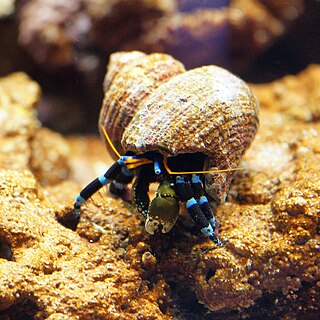
Calcinus is a genus of hermit crabs in the family Diogenidae, containing the following species:

Paguristes is a genus of hermit crab in the family Diogenidae. It includes the following species :

Dardanus is a genus of hermit crabs belonging to the Diogenidae family.

Diogenes is a genus of hermit crabs.

Ciliopagurus is a genus of hermit crabs, of the family Diogenidae, which are sometimes referred to as the "left-handed hermit crabs", because in contrast to most other hermit crabs, the left chela (claw) is enlarged instead of the right. They are found in the Indo-Pacific region and in the eastern Atlantic Ocean.
The Pylojacquesidae are a small family of hermit crabs, comprising only two monotypic genera. The family was erected in 2001, after two specimens at Museum für Naturkunde at the Humboldt University of Berlin were recognised as being quite distinct from other described hermit crabs. The family members differ from other hermit crabs in that their mandibles are chitinous and toothed.
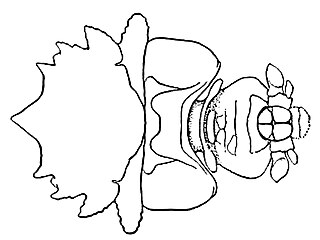
Porcellanopagurus is a genus of hermit crabs. The genus occurs in the Pacific and Indian Oceans.

Cancellus is a genus of hermit crabs in the family Diogenidae. Members of this genus are most commonly found living in small crevices in the outer continental shelf at mesophotic depths. They can be found living in rocks, sponges, and algae among other places. The genus has a cosmopolitan distribution. Four species are known from the western Atlantic.
Pylopaguropsis is a genus of hermit crabs containing the following species:

Calcinus morgani, commonly known as Morgan's hermit crab, is a species of hermit crab in the family Diogenidae found in the Indo-West Pacific region, the type locality being Indonesia.

Aniculus is a genus of aquatic hermit crab of the family Diogenidae.
Calcinus revi, commonly known as the white hermit crab, is a species of hermit crabs in the family Calcinidae.

Paralomis granulosa, also known as the false king crab, the Chilean snow crab, and centollón (Spanish), is a species of king crab.















